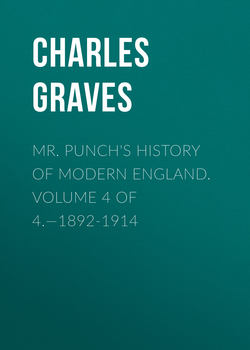Mr. Punch's History of Modern England. Volume 4 of 4.—1892-1914

Реклама. ООО «ЛитРес», ИНН: 7719571260.
Оглавление
Graves Charles Larcom. Mr. Punch's History of Modern England. Volume 4 of 4.—1892-1914
PART I. THE PASSING OF THE OLD ORDER
HIGH POLITICS
CAPITAL AND LABOUR
EDUCATION AND THE CHURCHES
THE ADVANCE OF WOMEN
INVENTIONS, DISCOVERIES, NOVELTIES
CHANGING LONDON
PART II. SOCIAL LIFE IN TRANSITION
CROWN AND COURT
VANITY FAIR
FASHION IN DRESS
LETTERS AND JOURNALISM
FINE ARTS, DRAMA AND MUSIC
SPORT AND PASTIME
Отрывок из книги
Transition and growth, change and decay and reconstruction marked the half-century covered in the previous three volumes. In the twenty-two years that divide the return of the Liberals in 1892 from the "Grand Smash" (as Mr. Page has called it) of 1914, these features are intensified to an extent that renders the task of attempting even a superficial survey perilous and intractable to one who is neither a philosopher nor a trained historian. The wisest and sanest of those who have lived through these wonderful times are too near their heights and depths to view them in true perspective. Whatever merit attaches to this chronicle is due to its reliance on contemporary opinion as expressed in the pages of an organ of independent middle-class views. It is within these limits a history of Victorians and post-Victorians written by themselves.
"Full closes," unfashionable in modern music, are generally artificial in histories. But the period on which we now enter did more than merely coincide with the end of one century and the beginning of another. It marked the passing of the Old Order, the passing of the Victorian age: of the Queen, who, alike in her virtues and limitations, in the strength and narrowness of her personality, epitomized most of its qualities; and of the type of Elder Statesmen, of whom, with the sole exception of Mr. Balfour, none remains at the moment as an active force in the political arena. Of the Ministry of 1892-5 the only survivor who mixes in practical politics is Mr. Asquith, but his record as a legislator hardly entitles him to the name of an Elder Statesman in the Victorian sense. Sir George Trevelyan, Lord Morley, Lord Eversley and Lord Rosebery have all retired into seclusion. So, too, with the Unionist Ministers who held office from 1895 to 1905. Veterans such as Lord Chaplin, Lord George Hamilton and Lord Lansdowne enjoy respect, but they do not sway public opinion, and are debarred by age from active leadership and office. Lord Midleton stood aside to make way for younger men when the Coalition Government was formed, and Lord Selborne is perhaps the only Conservative statesman who held office before 1906 who has any chance of sitting in a future Cabinet.
.....
Home politics fill a larger space in 1903 in Punch's pages than for some years previously. Remedial legislation in Ireland inspires the cartoon of Mr. Balfour as St. Patrick – a saint invaluable to the harassed cartoonist – driving out the snakes of sedition. The basis of Mr. Wyndham's Land Purchase Act is well shown in the cartoon illustrating the financial relations of the two countries. Tenant and landlord both present money-boxes labelled "Land Purchase" to John Bull, asking him to "put a thrifle in them"; John Bull scratches his head, but he pays all the same. The difficulties of Mr. Brodrick in securing national support for Army Reform are set forth in the verses on "The Unhappy Warrior" (after Wordsworth), and the cartoon "Ready, aye unready," with John Bull asleep on sentry duty —à propos of the Report of the Royal Commission on the South African war. A little later, John Bull's short memory is satirized in his protest against the size of his new watch-dog. Forgetting that he had clamoured for increase, he now declares that he cannot afford him.
At the opening of the year Punch had lavishly chronicled the glories of the Delhi Durbar. "The Pilgrims to the East" included three members of his staff, who did justice to the occasion both with pen and pencil, and Sambourne's fine cartoon, "Vivat Imperator," forms an instructive pendant and palinode to Punch's anti-imperialist misgivings of 1876, when he regarded the assumption of the new title as a piece of shoddy Disraelian Orientalism.
.....